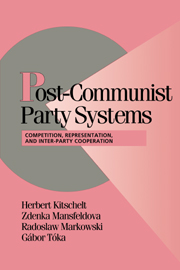Book contents
- Frontmatter
- Contents
- List of Figures and Tables
- Acknowledgments
- Introduction: Democracy and Party Competition
- Part I Theory: Party Systems and the Procedural Quality of Post-Communist Democracy
- 1 Historical Legacies and Strategies of Democratization: Pathways toward Post-Communist Polities
- 2 The Quality of Post-Communist Democracy: Patterns of Party Competition, Representation, and Inter-Party Collaboration
- Part II Setting and Research Strategy
- Part III The Structuring of Party Competition
- Part IV Political Alignments and Dimensions of Competition
- Part V Political Representation and the Quality of Democratic Governance
- Conclusion
- Appendix I List of Political Parties and Electoral Alliances
- Appendix II Questionnaire for the Elite Study
- Appendix III Population Survey Questions (Policy Opinions)
- Bibliography
- Index
- More Titles in the series
2 - The Quality of Post-Communist Democracy: Patterns of Party Competition, Representation, and Inter-Party Collaboration
Published online by Cambridge University Press: 05 June 2012
- Frontmatter
- Contents
- List of Figures and Tables
- Acknowledgments
- Introduction: Democracy and Party Competition
- Part I Theory: Party Systems and the Procedural Quality of Post-Communist Democracy
- 1 Historical Legacies and Strategies of Democratization: Pathways toward Post-Communist Polities
- 2 The Quality of Post-Communist Democracy: Patterns of Party Competition, Representation, and Inter-Party Collaboration
- Part II Setting and Research Strategy
- Part III The Structuring of Party Competition
- Part IV Political Alignments and Dimensions of Competition
- Part V Political Representation and the Quality of Democratic Governance
- Conclusion
- Appendix I List of Political Parties and Electoral Alliances
- Appendix II Questionnaire for the Elite Study
- Appendix III Population Survey Questions (Policy Opinions)
- Bibliography
- Index
- More Titles in the series
Summary
Democracy requires that all competent members of society enjoy essential civil and political rights to free, equal participation in the election of legislative representatives who control the government executive. The laws and constitutional stipulations about the election and the inter-play of legislative and executive branches shape relations of representation between citizens and political elites. From the bottom up, citizens are able to hold elected representatives accountable for their actions by endorsing or rejecting their reelection. From the top down, periodic elections make decision makers anticipate public accountability and encourage them to become responsive to citizens' demands. While even non-democratic regimes de facto involve some modicum of accountability and responsiveness between subjects and rulers, only democratic governance structures stipulate institutions with the explicit purpose to nurture relations of representation.
Civic and political rights determine a minimum floor for the operation of democratic representation. The quality of democratic accountability and responsiveness, however, hinges on the resources, skills, and dispositions of citizens and politicians as well as the specific design of constitutional and electoral rules that govern the inter-play between electoral constituencies and their representatives. Institutions shape the conversion of social preferences into political bargaining positions and binding allocations of valuable resources (“policies”). Neither societal resource distributions and corresponding political divisions alone nor political institutions, by themselves, determine the quality of the democratic process; rather their inter-play does. In all but very small communities, this inter-play is organized by intermediary political and civic associations, such as parties, interest groups, and social movements.
- Type
- Chapter
- Information
- Post-Communist Party SystemsCompetition, Representation, and Inter-Party Cooperation, pp. 43 - 92Publisher: Cambridge University PressPrint publication year: 1999
- 3
- Cited by



